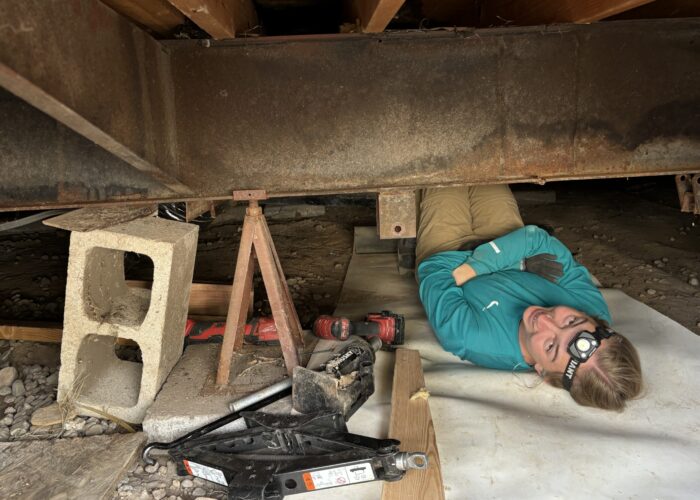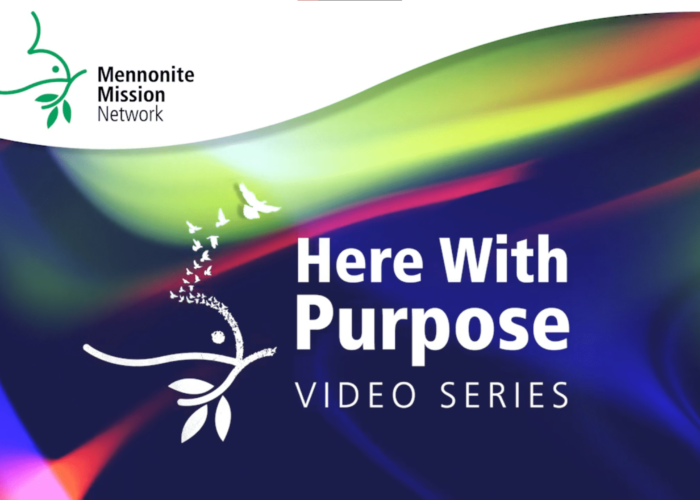Video transcript
My name is Eric Frey Martin from Mennonite Mission Network. This seminar is about our stories, how we tell them, how they get shaped and how we can join our stories with God’s story. In my mind, you might be watching this seminar together as a youth group or in a small group. And so throughout our time together, I have some times for us to tell stories or have discussion or ask questions of one another. So during those times, I am going to ask you to pause the video. So you may want quick access to your remote so that you can have that available during those times. The advantage of a virtual seminar is that you can do this on your own time so feel free to pause for as short or as long as your gathering and processing needs.
As I said this seminar is about stories and we are constantly telling stories. We might do this by using words that include characters, a setting, a plot, an ending. This is one way of telling a story. Or we might tell a story about ourselves in more subtle ways, without using words. For example, before recording this video, I thought a lot about what I would wear, because the clothes we wear and how we appear present a kind of story to the people we are in front of. This seminar is for youth, so I wanted to wear something in that sweet spot in which I would still appear to look kind of cool but also recognize that I am a 35 year old bald guy so I don’t want to try too hard…maybe I’ll wear a hat? But you get my point, how we present ourselves tells a bit of a story, at least a story that goes on in our minds.
Yes, we are constantly telling stories and sometimes those stories we are telling are to others, maybe most of the time, those stories are stories we are telling ourselves and oftentimes just ourselves. We constantly have in our minds a running narration of who we are. We are telling the story of ourselves, sending messages out to others and inward to ourselves. Messages about things we are confident about, or messages about our weaknesses. And we are constantly adding to our stories. As we have new experiences and things happen to us, they give us a new chapter, or a new edit to how we are telling our stories. And that larger story that we are telling ourselves and projecting out to others becomes who we are. The stories that we tell ourselves, that we tell others make up the person we become.
A story I like to tell about myself is that during the time I was in college but in the summer and I was working a landscaping summer job and my boss went to my church and was organizing the annual church baseball game. The teams were married vs. singles and he was worried about not having enough singles to make up the team and begged me to sign up. The problem was that it was also a night that one of my friends was having a birthday party that I really wanted to go to, but I said I could at least come to the first part of the baseball game. Now, I’m not saying I’m terrible at baseball, but it was definitely something I quit in little league because I only got three hits the whole season. So this wasn’t something I was super excited about.
On the night of the game, it started off with a cookout and the game sort of got pushed back a while and so I was really getting crunched for time if I wanted to make it to my friend’s birthday party. By the time we started, I was already late, so I asked the coach of the singles team if I could just play the first inning and then leave since there were indeed enough people to make up a team without me. He agree and let me bat first. So, I went up to bat, thinking I would just try to get this over with and move on to my party. And so when the first pitch came, I swung as hard as I could, I made direct contact and to my everlasting surprise, that ball sailed past the outfield fence. I didn’t even know I could hit a home run. I rounded the bases touched home base, kept on running, grabbed by glove, kept on running to my car and went to my friend’s birthday party. I knew in that moment I would never be cooler than hitting a home run and just leaving right away like it was no big deal.
Now, I want you to think of a story that you like to tell. Maybe it is the funniest story you can think of, or a story in which you accomplished something you are proud of. But I want it to be story that is about you. It doesn’t need to be long or intricate, just a story that brings back good memories about the person you were in that moment. Go ahead and in your groups quickly tell these stories to one another. You can go ahead a pause the video here.
If you remember back to my story, I told that story because I like what it says about me. I like projecting this image of myself to others. Perhaps you told stories about experiences in your past because you also like the way they make you look to others or maybe it is just as simple as you like the way you are portrayed in it yourself, you remember those good feelings of laughing about that experiences or feeling pride in an accomplishment and this get projected outwards to those around you. It isn’t just the content of the story itself that is projected outwards but it is also the messages that come with it. The message of I am a funny person, or like to have fun. I am a person who can do hard things. When we tell stories it becomes and inward and outward process. We are informing ourselves again of who we are, but also informing others about who we are. So we can see that telling stories shapes who we are becoming but also what we are putting out in the world around us.
As I said earlier, I work for Mennonite Mission Network and one of the ways we talk about what we do is that we want to give witness to what God is doing in the world. In other words, we want to be listening, watching, and sensing the story that God is telling and enacting in the world around us. We want to join our stories with God’s story. In churches and faith gatherings, we hear a lot about mission, maybe even evangelism and especially when we talk about stories and faith we hear the word testimony. Now, all of these words have an outward direction to them. They speak of going out, outside the church, sharing our faith with others. And honestly, these can be troubling concepts for a lot of us though as well. We don’t want to impose our faith on others who don’t want to listen. We don’t want to come across as trying to sell something. For a lot of us, we are still trying to figure out our own faith so how can we even share something we are not sure we get ourselves, with others. And with so much division in our world around religion and politics, in a time when the words Christian and evangelical can mean so many different things and not always in a positive way, how do we actually go about living out a faith that can be shared with others? Let me propose that perhaps one of the best ways we can do this is by letting God enter our stories. All of our stories. The stories we tell ourselves and the stories we tell others. I’m not talking about a character necessarily, but rather that we let God inform the larger narrative that we are telling ourselves and that we are then projecting out to others.
In the next part of our seminar, I am going to be having you pause the video a lot in order to go through a process in which we can more intentionally think about how God is maybe wanting to speak into our stories and situations. This process comes somewhat out of a book called "Making Faith Sense" by Robert Kinast and helps us to look at our stories in a new way.
Earlier, you told stories about yourself that you probably have told before. These are the stories that we are most likely to tell others, the stories that make us look good within that story or at least are entertaining and so make us look good in the moment of telling it. However, now I want us to shift gears a bit. All of our experiences are not good or positive. We all live with some amount of trauma or pain that has happened to us. These experiences too get incorporated in our larger stories. Often, these are not the stories though that we tell verbally, but perhaps in other ways they get projected out. We all have stories of failing at something, and perhaps we have some insecurity around those things. We don’t tell these stories and therefore we never process them. We pretend they don’t exist, but this is precisely how they impact us even more in that we then project these experiences and stories out through our insecurities, our fears, our self-doubt. In this way, these are some of our most important stories because they impact us so much but they aren’t fun stories to tell and so we hold on to them and we end up being the keepers of these stories of pain or failure that only we speak into and often times those messages of pain and failure multiply by our tendency to dwell on the negative things about us in order to keep these parts of our stories from others.
I’m not asking you to necessarily tell these stories in your groups, but as we go through this process, perhaps you can be thinking about some of those personal stories as well.
Rather, what I want to do right now is talk about a story that applies to all of us but is also very much personal. This past year has been weird. In March of 2020 a pandemic hit and not much has been the same since. In addition, we have seen fractures in our society, we have seen the brutality of racism, there are constant debates that breed mistrust between people. In addition, you have all had your own struggles, joys, accomplishments, and failures over the past years plus. So thinking about this past year since the pandemic started, lets tell our stories a little bit. So go ahead and in your groups, and if you are a large group, maybe partner off or have groups of three in order to save time, go ahead and just sort of tell the stories of your past year. Take turns telling your stories and try not to interrupt each other or even respond to each other at this time. We will have time for question and conversation later, but now is a time for each person to share their experience of this past year. What has happened? Include how you felt during these events. Talk about the experiences we have all had, and also the ones, as you are comfortable, that you have experienced personally. Go ahead and pause the video and tell these stories.
As you tell these stories, I wonder what new things came up for you. As I reflected on my own story of the past year, I began to recognize how unconnected I feel to communities I used to be close with. I began to recognize how in some ways I am grieving losses that have been felt in this past year, because of COVID but also because of other factors. When we tell our stories out loud instead of just letting them stay inside us, we gain a new perspective. When we do this with others we gain even more, we gain their perspective. So, lets keep going with this. Continuing to think about these stories that you have told, ask one another questions that came up for you in the other people’s stories. Questions like: asking for more clarity on something that was said, Why did they choose to frame what they said in a certain way, or did I hear it wrong. What new things arose in your understanding around your own situation, or did something someone else say bring up a new and enlightening for you? Why was something important enough to include in their story. Go ahead and pause the video again and spend just a few minutes asking each other questions around the stories and experiences you have shared.
Now comes the part in which we start inviting God to speak into stories. During this next section, I want you think about how your experiences connect with your faith. It may connect in several different ways. It may feel at first that it doesn’t connect at all. But explore a little deeper how your faith informs your perspective of these events. Here are some questions to think about this:
Is there anything in scripture that connects to your experiences? Any stories or passages that come to mind?
Where Do you see God in the midst of your experiences? How might God be working in the midst of this past year?
Feel free to explore with these questions, remembering that God welcomes questions and is not scared of them.
Have these events brought up doubts for you? How has your faith sustained you in the past year? How has your faith wavered? Is the way you are interpreting these events consistent with your understanding of God? Or does it feel a little different?
Now I want to be careful in this section, because we could easily attribute to God responsibility for pandemics, brutality, pain and suffering and so on. I think it is important for us to recognize that our main goal here is not to assign responsibility for why things happen, but rather to recognize that while God does not cause all things necessarily, God uses all things. So, as we ask these questions, we can take what we already know about God through scripture and our experiences and think about how God might be working through the events of this past year in our world and in our lives.
So go ahead an pause again taking time to discuss and ask these questions about how these events connect to your faith.
Finally, in this last section, in your groups or with your partner. I want you to think about how God might be calling you respond to these events. How God might be asking you to reshape your stories and your perspectives.
Ask these questions of yourselves and discuss in a group:
Have these experiences affirmed something I already believed about God, my faith, myself or the world around me?
Have these experiences challenged me to rethink my beliefs and practices in any way?
In what ways has my perspective changed through this past year or through this process?
In what ways am I being called to a change in my life, or a conversion of sorts? Recognizing that conversion isn’t necessarily just a one time event but something that we are always doing as we grow in our faith. What new things and understandings is God calling me towards?
We are constantly telling stories. Projecting out to the world a version of ourselves. As we think about what the world needs from us as Christians. What our mission in the world can be, perhaps we can start by inviting God into our stories. By allowing God to shape the narratives that first we tell ourselves, we will join in the ongoing story of God’s work in the world of redeeming all of creation. the stories that then naturally spring forth from us will echo God’s love and care for others.
The process we have done here in thinking about our last year hopefully has given a way for your to intentionally think through other events in your lives and given you a new perspective about how the messages we tell ourselves can be reshaped by being a witness to God’s work in our lives and in the world. I encourage you to continue in your groups to tell your stories and to think about them with the perspectives of others, encouraging and blessing each other in this way.
Finally, I want to say that when we join our stories up with God’s that the enduring message we will surely hear and the single thing I hope you hear me say today is that you are a beloved child of God. You are deeply loved and you are good. Our stories always begin and end with this truth no matter what our circumstances. So I will leave with your this verse from Romans 8 which says: For I am convinced that neither death, nor life, nor angels, nor rulers, nor things present, nor things to come, nor powers, 39 nor height, nor depth, nor anything else in all creation, will be able to separate us from the love of God in Christ Jesus our Lord. This truth is at the core of each of our stories.
Blessings to each of you!



